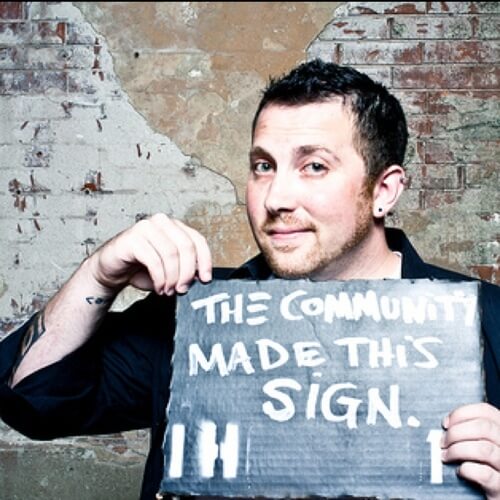This post is part 4 of a 5 part series exploring the 5 core values of coworking: Collaboration, Openness, Community, Accessibility, and Sustainability.
I think community is my personal favorite of the coworking core values, and perhaps one of the most misunderstood or most often taken for granted.
It’s easy to make mistakes around the idea of community. Experts in the field of sociology can’t even agree on a definition, Wikipedia mentions that by the 1950’s there were nearly 100 “discrete definitions”.
It’s the people.
In the context of coworking, though, I believe that a focus on community means putting emphasis on the people, their interactions, and the relationships that form above everything else. At Indy Hall, every decision we make considers members and their opportunities to interact with one another.
We > Me
We organize events that encourage people to explore each others interests in and outside of work. Show and Tell, Lunch & Learns, and Happy Hours provide a spectrum of formal and informal opportunities to step away from the desk and get to know a coworker.
We share rituals and experiences that allow new members to join the tribe and develop camaraderie.
We broadcast our favorite places to hang out outside of our coworking space so that people can easily gather on their own.
We attend and support other events and initiatives together, both enhancing them with the sense of “togetherness” but also showing the uninitiated that the “togetherness” is accessible to them.
We learn, share, grow, play, experiment, celebrate together. We commiserate and console each other as well.
The coworking space is a tool
A coworking space is just that – a space. It’s not a community until it has people in it.
Geoff and I wrote about Coworking as a “clubhouse”, and I think that language is more accurate of a description than “office” for most of the best coworking spaces in the world. But it’s important to remember that in order for a clubhouse to be useful, a club – a community – should be in need of a home.
This is why I stress the “community first” not just as a mental model (as in, “consider the community first”), but as an order of of operations. Can a community form because a coworking space exists? Absolutely. But it takes time, and therefore a financial runway for what might be an undeterminable amount of time.
You don’t own a community, you belong to a community.
Its that very natural sense of belonging that I think drives people to coworking spaces more than anything else. But I think that as a coworking space owner, it’s important to remember that you’re not the coworking community owner.
I think the best relationship for a coworking space owner to have is to belong to the community that inhabits the space. That connection is authentic, and therefore breeds more authentic relationships in the space. You don’t necessarily need to be a leader in that community, but you should be prepared to be an active member of that community.
I was actually remarking to my friend this morning that I absolutely love that I can come to Indy Hall as a member, far more than I care about coming to Indy Hall as an owner. The oft-forgotten truth is that coworking space owners can get the same benefits from coworking as the members do, mostly due to the fact that they themselves are (or should be) members.
Communities of Trust
People in proximity is a good first step towards community, but as I’ve said community doesn’t really happen until people are interacting. We’ve found that relationship formation is the primary event that transitions a group of people towards being a “community”.
If relationships between coworking members are like tendons, then trust is the the muscle that makes a coworking community strong and healthy.
We start by trusting our members, and knowing that sets a stage where trust is a valued part of being a part of the community. When you start the relationship with coworking members off on one where you don’t trust them, you can’t ever expect them to trust you, either.
No two communities are identical
Indy Hall’s original tagline was “this is how Philadelphia does coworking”, and we remain true and honest to that statement. We didn’t stick a CitizenSpace clone in Philly, we looked around and took the time to understand the communities that already existed, what those people were like, and how a Philly-flavored coworking space would work.
I wouldn’t ever encourage somebody to replicate Indy Hall, nor do I think it’s really replicate-able. Instead, I urge people to learn from the lessons we’ve learned, share some of our ideas, but interpret them to fit their community .
I personally think that the coolest thing is that communities, like the people in them, have personality. Squelching that personality is a waste – instead, embrace it. Own it. Live it. You’ll love it.
Want more? Here are my other essays on the core values: Collaboration, Openness, Community, Accessibility, and Sustainability
To the comments!
This is my perspective on community as it pertains to coworking. What’s yours? Leave a comment below.
 I am always thinking about the intersection of people, relationships, trust and business. I founded
I am always thinking about the intersection of people, relationships, trust and business. I founded